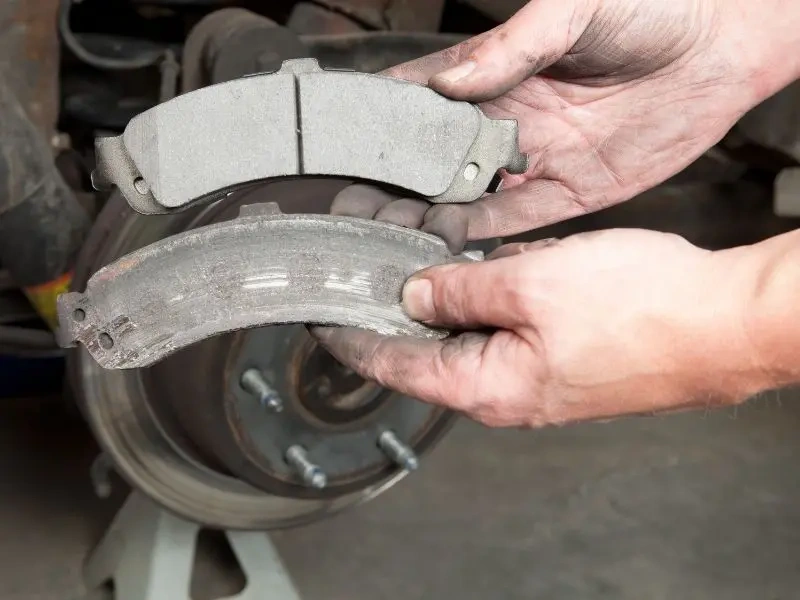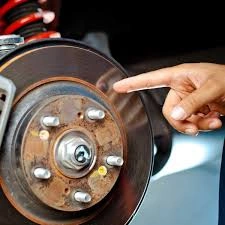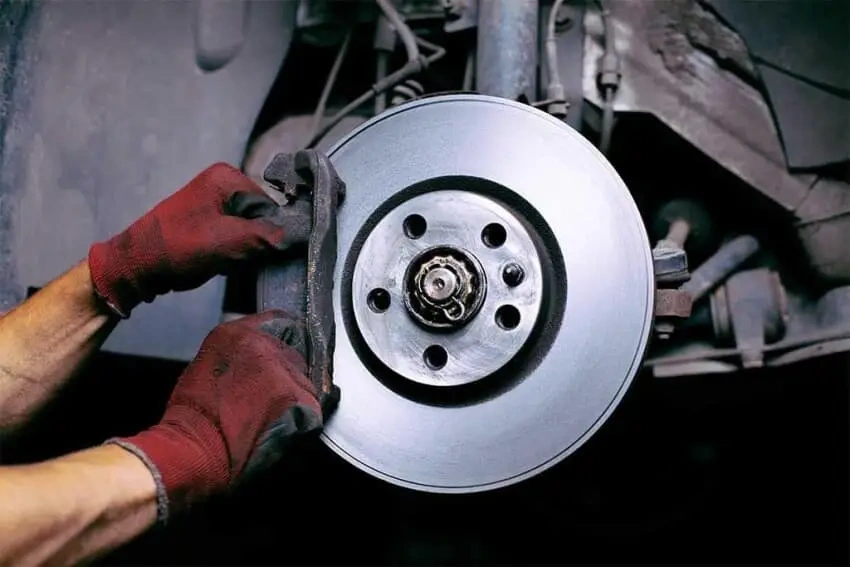OUTLINE:
Why Are My Brakes Grinding
 140
140When you step on the brake and hear that unsettling friction sound, it's really unsettling, and this unease makes sense. If you are thinking to yourself, 'Why are my brakes grinding?' then you need to understand that this sound often means there is a problem with the braking system, and you cannot be careless.

Image Source:The Auto Llama
Whether it's the brake pads being worn thin, debris entering the system, or more serious issues such as a broken rotor, identifying the root cause is crucial to ensuring your safety. Let's explore the possible reasons behind this frightening sound together and understand when to take action to keep your car running smoothly.
Lead-in: What Does Brake Grinding Mean
Hey, what driver doesn't have a headache hearing that grinding sound when braking? This sound is often a signal of a problem with the brake system, which may be due to worn brake pads or serious malfunctions in large components such as rotors and calipers. Understanding the meaning of brake noise is very important. If it's not taken seriously, not only is driving unsafe, but repairing it will also cost a lot of money.
Let's talk about the common reasons behind this scary noise and what it may mean for your car.
And Please continue reading the following content, which can reveal the secrets of these strange sounds for you.
Why Are My Brakes Grinding[Reason Analysis]

Image Source:Family Handyman
If you are thinking to yourself, 'Why is my brake grinding?' then it means you need to pay attention to your braking system. Brake noise may be a minor issue or a major hidden problem. We need to elaborate on the most common reasons:
1. The brake pads are worn thin
Brake pads are made of friction materials, and when you step on the brake, they press onto the rotor to slow down. Over time, this material will wear away. The brake pads are too thin, and the metal backing plate directly rubs against the rotor, making a sound like sharpening a knife.
What to pay attention to:
There may be a creaking or creaking sound before it rings.
The brakes are not as responsive, and the parking distance has increased.
2. Added miscellaneous items
Small stones, sand, metal sheets, and the like can all be sandwiched between brake pads and rotors. This clip not only makes noise, but may also leave marks on the rotor.
How did you get in:
Walk on dirt roads or cross construction sites.
Poor maintenance often leads to the accumulation of dirt.
What are the risks:
Over time, the rotor becomes uneven and the brakes become unstable.
3. The rotor is broken
The rotor is the disc pressed by the brake pads, which may deform, have scratches, or rust. These issues can all lead to brake noise.
Common reasons:
Frequent sudden braking or downhill, the rotor is too hot.
The brake pads are worn out and not replaced, causing damage to the rotor.
Checking Method:
I feel a jolt when braking.
There are obvious grooves or rust on the rotor.
4. There is a problem with the caliper
A caliper is the thing that holds the brake pads in place, pressing them onto the rotor as soon as the brake is applied. If the caliper gets stuck or broken, the braking will be uneven or keep making noise.
Symptoms:
Feeling pulled to one side while driving or braking.
There is a burning smell near the wheels.
5. The wheel hub bearing is broken
Although this is not directly related to the braking system, it can still make a noise if it breaks down, and sometimes it can be easily confused with the brake noise.
How to distinguish:
It sounds even without stepping on the brake.
The sound will change tone when turning.
Incorrect installation or inadequate maintenance
If the newly replaced brake pads or rotors are installed incorrectly, they may also rub against other things. Also, some places need to be lubricated or adjusted properly, otherwise they will also make noise.
We need to take a look:
6. Just finished repairing the brake and it started to sound.
Uneven wear of brake pads or rotors.
When Should You Worry About Grinding Brakes

Image Source:Hendrick Chevrolet Monroe
If you are thinking to yourself, 'Why is my brake grinding?' and wondering if it's safe, then you need to understand that brake noise is not a small matter. This sound often indicates that there is something wrong with your braking system, which may affect the performance and safety of the car. Especially when you hear the gringding sound when you step on the brake, it's probably because the brake pads are worn out and the metal back plate is rubbing against the rotor. Over time, the rotor may require major repairs, which will cost more money.
Also, if there is a noise even without applying the brake while driving, it may be due to a faulty wheel hub bearing or a stuck caliper, both of which are unsafe driving situations. If the sound is accompanied by vibration, the brake pedal jumps, there is a burning smell, or the dashboard lights up, then you need to deal with it quickly. These symptoms indicate that your braking system is not working properly, and the braking force may decrease. In severe cases, the brakes may even malfunction.
For safety reasons, the sound of brakes cannot be ignored. Once these symptoms are detected, it is necessary to quickly seek professional help to investigate. Dragging without repairing may not only cause the car to break down more severely, but also harm oneself and others. Be proactive in maintaining the brakes. Whenever you hear a noise, you need to check it to ensure that the brakes are reliable and safe.
How Do I Stop my Brakes from Grinding
If your brakes are grinding, it’s usually a sign that something is wrong with the brake components. Here's what you can do to stop the grinding:
-
Check the Brake Pads:
-
Worn pads: If your brake pads are worn down, they may need to be replaced. Check the thickness of the pads — if they are below 1/4 inch, they should be replaced.
-
Inspect for debris: Sometimes debris or dirt trapped between the brake pad and rotor can cause grinding. Cleaning the components might help.
-
-
Check the Brake Rotors:
-
Damage: If the rotors are deeply scored or worn, they might need to be resurfaced or replaced. Grinding sounds can result from worn-out rotors rubbing against the brake pads.
-
Warped rotors: If the rotor is warped, it may cause uneven contact with the pads, resulting in noise. These may need to be replaced or resurfaced.
-
-
Lubricate the Components:
-
Apply brake grease or lubricant to the areas where metal parts move, such as the caliper pins, to prevent friction-related grinding.
-
-
Check the Brake Hardware:
-
Loose components: Sometimes, the grinding sound could be caused by loose or worn brake hardware (such as clips or shims). Inspect and replace these parts if necessary.
-
-
Avoid Driving Too Long With Grinding Brakes:
-
Continued driving with grinding brakes can cause more damage to the braking system and reduce stopping performance. It’s best to address the issue as soon as possible.
-
-
Visit a Mechanic:
-
If you’re unable to identify or fix the issue yourself, it’s a good idea to have a mechanic inspect your brakes and replace any worn components.
-
Is It Expensive to Fix Grinding Brakes
The cost to fix grinding brakes can vary depending on the cause of the issue and the specific repairs needed. Here's a breakdown of potential costs:
-
Brake Pad Replacement:
-
Cost: Typically $100 to $300 per axle (parts and labor).
-
If the grinding is caused by worn-out brake pads, replacing the pads should fix the issue. Luxury or performance vehicles may be on the higher end of this range.
-
-
Rotor Replacement:
-
Cost: Typically $200 to $500 per axle (parts and labor).
-
If the grinding has caused damage to the brake rotors (they are scored or worn down), they will need to be replaced or resurfaced. If rotors are resurfaced, it may cost less (around $100 to $150), but this depends on their condition.
-
-
Brake Fluid and Other Components:
-
Brake Fluid: $50 to $100 (if low brake fluid is contributing to the issue).
-
If other components like calipers or brake lines need attention, this could add to the cost.
-
Final Verdict
Brakes grind primarily due to worn-out brake pads, which cause metal-to-metal contact with the rotors. Other potential causes include damaged or warped rotors, debris between the pads and rotors, or a lack of lubrication on braking components. Ignoring grinding brakes can lead to further damage and costly repairs, so it’s essential to address the issue promptly by replacing worn parts or addressing any underlying issues.

Disclaimer: The views and opinions expressed by individual authors or forum participants on this website do not represent the views and opinions of Chipsmall, nor do they represent Chipsmall's official policy.

share this blog to:

